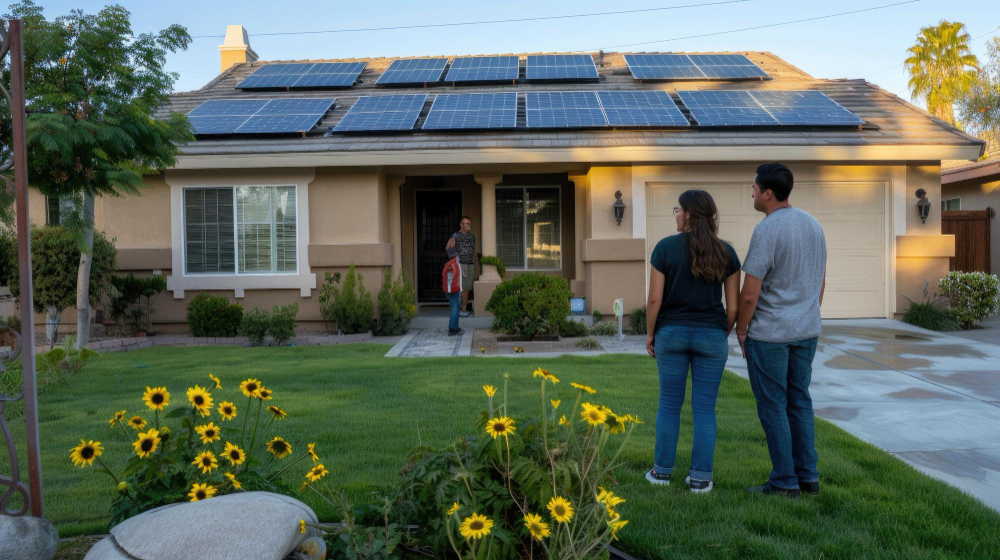
Turning Sunlight into Savings
Are you interested in lowering your electricity bill while living more sustainably? Solar power is one of the smartest ways to power your house. It’s clean, renewable, and increasingly affordable. With better tech, government subsidies, and increasing electricity costs, solar power for homes in India is more practical than ever.
What Does “Solar Power to House” Mean?
It means using solar panels (mounted on your roof) to generate electricity that can power all your home’s electrical needs—lights, fans, appliances, and even air conditioners.
Here’s how it works in 3 simple steps:
- Solar panels absorb sunlight and convert it into DC electricity.
- An inverter converts DC to AC power (what your home appliances use).
- Your home draws power from the solar system during the day. You either store any excess power (off-grid) or send it to the grid (on-grid).
Choosing the Right Solar System for Your House
1. Grid-Tied System (On-Grid)
- The system is connected to your local electricity grid.
- The system provides power to your home during the day.
- Extra energy is exported back to the grid.
- At night or during low production, you draw power from the grid.
- This system is particularly suitable for use in urban and semi-urban areas.
2. Off-Grid System
- The Off-Grid System operates without being connected to the grid.
- Batteries are necessary to store energy for use at night or during outages.
- The initial investment is more substantial, yet it ensures complete energy self-reliance.
3. Hybrid System
- The hybrid system combines both on-grid and off-grid features.
- It offers both battery backup and grid access.
- Best of both worlds, but costlier.
How Much Solar Do You Need?
It depends on your electricity usage.
| Home Type | Monthly Usage | Recommended System |
|---|---|---|
| 1 BHK Apartment | 100–150 units | 1–2 kW |
| 2–3 BHK Home | 250–400 units | 3–5 kW |
| 4+ BHK/Villa | 500+ units | 6–10 kW |
👉 1 kW = ~4 units/day underfavorabled sunlight conditions.
Cost of Installing Solar Power to House
The cost varies by system size, location, and brand, but here’s a general idea:
- 1 kW: ₹60,000–₹80,000
- 3 kW: ₹1.5L–₹2.2L
- 5 kW: ₹2.5L–₹3.5L
This includes:
- Solar panels
- Inverter
- Mounting structure
- Wiring & accessories
- Installation
You may be eligible for subsidies under the PM Surya Ghar Muft Bijli Yojana:
- ₹30,000 for 1 kW
- ₹60,000 for 2 kW
- ₹78,000 for 3 kW and above
Net Metering: Save More, Earn More
Net metering is a billing system where excess energy your system generates is sent back to the grid, and you earn credits. These credits offset your nighttime usage or low-production days.
Net metering has significantly improved solar ROI in many Indian states.
Benefits of Solar Power at Home
- Lower Bills: Save up to 90% on your electricity costs.
- Eco-Friendly: Reduce your carbon footprint.
- Boost Property Value: Homes with solar are more desirable.
- Energy Independence: Especially with hybrid or off-grid systems.
- Low Maintenance: Clean panels 3–4 times/year and check connections.
How to Get Started
- Energy Audit: Understand your electricity needs.
- Roof Inspection: Make sure your roof has enough unshaded space.
- Choose a System: On-grid, off-grid, or hybrid.
- Apply for Subsidy: Through solarrooftop.gov.in
- Hire Certified Installers: Check credentials, reviews, and after-sales service.
- Enjoy Free Power!
Internal Keywords for Linking
- Industrial Solar Panel Installation
- Panasonic EV Charger
- Solar Refrigerator
- bipv solar panels india
- sun power solar panels for sale
- solar installation companies
- solar system installation
People Also Ask
Q1. Can solar panels power ACs and refrigerators?
Yes! With the right system size, you can power all appliances, including ACs, washing machines, and solar refrigerators.
Q2. What’s the lifespan of solar panels?
Solar panels have a lifespan of 25–30 years with minimal degradation.
Q3. Is solar installation noisy or disruptive?
Not at all. Most rooftop installations are completed in 1–3 days with minimal disturbance.
Q4. What maintenance is required?
Periodic cleaning, inverter health checks, and annual inspections are required for maintenance (many vendors offer AMC).
Final Thoughts
Installing solar power to house is no longer a luxury—it’s a wise investment that pays off in savings, independence, and sustainability. Whether you’re a first-time homeowner, an eco-conscious buyer, or someone looking to cut monthly bills, solar is the future.
In 2025, there’s never been a better time to go solar—especially with government incentives, improved technology, and expert Solar Panel Contractors to help you at every step.
